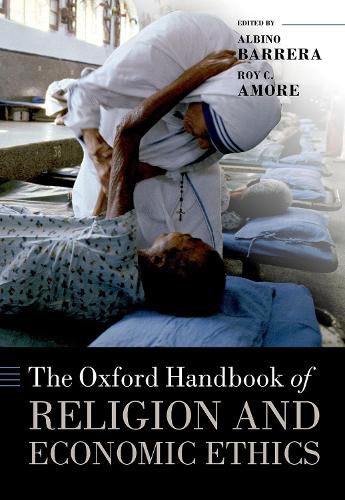Readings Newsletter
Become a Readings Member to make your shopping experience even easier.
Sign in or sign up for free!
You’re not far away from qualifying for FREE standard shipping within Australia
You’ve qualified for FREE standard shipping within Australia
The cart is loading…






What do world and regional religions say about economic morality? The Oxford Handbook of Religion and Economic Ethics presents together for the first time the key tenets and teachings of numerous faiths on this subject. In doing so, it also compares the major religions in their positions on various social, business, and policy topics, such as consumerism, competition, ecology, and feminism. It concludes with an analytical synthesis that presents and explains the patterns that emerge from the various religions and themes explored across the Handbook's chapters. Together, these chapters underscore a symbiosis between religion and economic life as they mutually enrich each other. On the one hand, religion improves the efficiency and efficacy of economic life by lowering the frictional and monitoring costs of market operations. Virtuous market participants internalize norms of good economic conduct and behave accordingly. On the other hand, socioeconomic life offers manifold enticements, comforts, and overindulgences that paradoxically push devout adherents to invest themselves even further in their beliefs. Socioeconomic life provides an opportunity for religions to build strong faith communities and for believers to reify their religion in their economic conduct. This Handbook presents the richness, nuances, and rationale of religions and their economic ethics. Readers will discover a remarkable convergence in religions' teachings on economic morality, despite their wide differences in dogma, ecclesial structures, and social practices. This confluence can be traced to similarities in the underlying anthropologies and cosmologies of these faiths. Finally, this Handbook shows, the major faiths share far more values than divide them, at least when it comes to economic morality.
$9.00 standard shipping within Australia
FREE standard shipping within Australia for orders over $100.00
Express & International shipping calculated at checkout
What do world and regional religions say about economic morality? The Oxford Handbook of Religion and Economic Ethics presents together for the first time the key tenets and teachings of numerous faiths on this subject. In doing so, it also compares the major religions in their positions on various social, business, and policy topics, such as consumerism, competition, ecology, and feminism. It concludes with an analytical synthesis that presents and explains the patterns that emerge from the various religions and themes explored across the Handbook's chapters. Together, these chapters underscore a symbiosis between religion and economic life as they mutually enrich each other. On the one hand, religion improves the efficiency and efficacy of economic life by lowering the frictional and monitoring costs of market operations. Virtuous market participants internalize norms of good economic conduct and behave accordingly. On the other hand, socioeconomic life offers manifold enticements, comforts, and overindulgences that paradoxically push devout adherents to invest themselves even further in their beliefs. Socioeconomic life provides an opportunity for religions to build strong faith communities and for believers to reify their religion in their economic conduct. This Handbook presents the richness, nuances, and rationale of religions and their economic ethics. Readers will discover a remarkable convergence in religions' teachings on economic morality, despite their wide differences in dogma, ecclesial structures, and social practices. This confluence can be traced to similarities in the underlying anthropologies and cosmologies of these faiths. Finally, this Handbook shows, the major faiths share far more values than divide them, at least when it comes to economic morality.